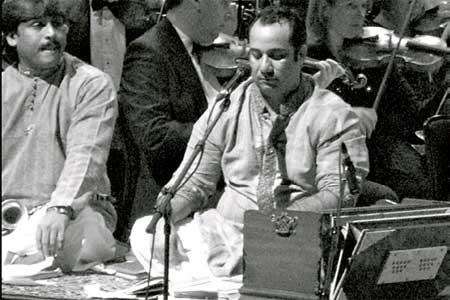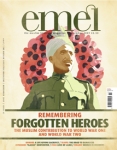
Remembering Nusrat
Issue 62 November 2009
Musician: Rahat Fateh Ali Khan
Conductor: Michal Seal
Presented by Saregama Events - www.saregamaevents.com
Review by Ayman Khwaja
As I enter the Royal Festival Hall, seating for a 75-piece orchestra glimmers under the dimmed stage lights, with Rahat’s qawali platform a little off centre stage; adorned with his infamous harmonium and percussion instruments.
As the lights go up on stage, the Birmingham Symphony Orchestra take to their seats and the stage is suddenly busy with violins, cellos, double basses, clarinets, trumpets and a magnificently large harp. As the musicians begin tuning their instruments, there is an electric energy circling the auditorium. Twelve years after the death of the most famous qawali singer the world has yet known, this tribute concert is unlike any other musical event - because it is being performed by Nusrat Fateh Ali Khan’s nephew, Rahat Fateh Ali Khan.
Rahat has become a pioneer in the music industry in his own right, training with his uncle’s group since 1989 to master the art of qawali. Having worked on multiple movie soundtracks, including the infamous 1995 soundtrack to ‘Dead Man Walking’, Rahat’s skill as a qawal is unmistakable. As the orchestra settles and the lights dim, Nikki Bedi announces the arrival of ‘Ustad Rahat Fateh Ali Khan’ and the entire audience erupts in applause. As Rahat takes to the stage, I realise that he exudes the very same humility and grace that his uncle was renowned for.
Conductor Michael Seal lifts his baton and the orchestra bursts into sound. The sheer impact of the merging instruments; the percussion of the Indian classical tabla and the string ensemble is so overwhelming that I am moved to tears. Nusrat Fateh Ali Khan had an indescribable desire to constantly experiment with different genres of music. A dozen years after the maestro’s death, his nephew Rahat Fateh Ali Khan and the Birmingham Symphony Orchestra have accomplished just that: eliminating boundaries and creating musical experiences that profess unity.
The beauty of qawali exists in its chameleon-like nature; for one verse to soothe the soul gently to sleep and another so passionate and intense, that it shatters the senses into a million shards of emotion. As Rahat begins his rendition of ‘Allah-hoo’, with the accompanying orchestra, the audience is indeed left experiencing a myriad of emotion.
What surprises me most however, is the passionate responses from the orchestra members themselves that Rahat’s qawali evokes. I look over to the right of the stage and see the double-basses tapping their feet to the tabla’s beats; at the back of the stage, the percussion players have abandoned their instruments and are clapping their hands intently to mimic that of Rahat’s qawali singers and to the right, the string ensemble time their arcos to correlate with the pitch and tempo of Rahat’s voice.
Rahat’s voice, like that of his uncle’s, is equally phenomenal. For one to employ the human voice as an actual instrument is beyond comprehension; it surpasses what is commonly known as singing, and becomes an elevated form of expression. Someone once said that qawali, with all its Sufi poetical substance, is almost an intrusion by the listener onto a man’s one-to-one conversation with his God. The mere fact that we are allowed to eavesdrop on such an intimate, personal communication is where the beauty lies in this art form; it stresses a commonality, a unity between us all. Yet, here lies the basic contradiction; this circle of elevated unity can only be experienced by one who understands the poetry, the language. I find myself constantly frustrated when I am unable to conjure up adequate words in the English language to translate Urdu poetry in a way that still communicates its magnificent substance to all my friends who I want to share this wondrous art form with. And here was the answer in front of me. By composing the orchestra into sync with the qawali, Tim Pottier had achieved the impossible – communicated the essence of Urdu poetry to the audience through musical expression.
Bookmark this |
|
Add to DIGG |
|
Add to del.icio.us |
|
Stumble this |
|
Share on Facebook |
|
Share this |
|
Send to a Friend |
|
Link to this |
|
Printer Friendly |
|
Print in plain text |
|


Comments
0 Comments